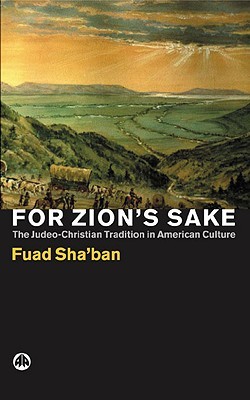
- We will send in 10–14 business days.
- Author: Fuad Sha'ban
- Publisher: Pluto Press (UK)
- ISBN-10: 0745322360
- ISBN-13: 9780745322360
- Format: 13.7 x 21.4 x 2 cm, softcover
- Language: English
- SAVE -10% with code: EXTRA
For Zion's Sake: The Judeo-Christian Tradition in American Culture (e-book) (used book) | bookbook.eu
Reviews
Description
This book explores the role of religion, especially religious extremism, in American culture. In particular, it examines the development of the Judeo-Christian tradition, its impact on America's self-image, and the way it has influenced America's attitude to the Arab World.
The Christian Right has become a very powerful force in American politics. Its basic belief in Christian Zionism has resulted in a steadfast commitment to the establishment of the state of Israel and to its aggressive expansion, and has made Zionism a central part of government policy, for both Republicans and Democrats. Fuad Sha'ban shows how this is not a new phenomenon: what he terms the 'Vision of Zion' in American life has its roots in literature, the arts and internal politics from colonial times until today. Looking in detail at a wealth of resources, including religious and literary texts, as well as official political statements, he pieces together a subtle account of how America's Puritan roots have fostered a specifically religious political culture that encourages hatred and suspicion of the Muslim World in domestic and foreign policy.EXTRA 10 % discount with code: EXTRA
The promotion ends in 17d.01:25:46
The discount code is valid when purchasing from 10 €. Discounts do not stack.
- Author: Fuad Sha'ban
- Publisher: Pluto Press (UK)
- ISBN-10: 0745322360
- ISBN-13: 9780745322360
- Format: 13.7 x 21.4 x 2 cm, softcover
- Language: English English
This book explores the role of religion, especially religious extremism, in American culture. In particular, it examines the development of the Judeo-Christian tradition, its impact on America's self-image, and the way it has influenced America's attitude to the Arab World.
The Christian Right has become a very powerful force in American politics. Its basic belief in Christian Zionism has resulted in a steadfast commitment to the establishment of the state of Israel and to its aggressive expansion, and has made Zionism a central part of government policy, for both Republicans and Democrats. Fuad Sha'ban shows how this is not a new phenomenon: what he terms the 'Vision of Zion' in American life has its roots in literature, the arts and internal politics from colonial times until today. Looking in detail at a wealth of resources, including religious and literary texts, as well as official political statements, he pieces together a subtle account of how America's Puritan roots have fostered a specifically religious political culture that encourages hatred and suspicion of the Muslim World in domestic and foreign policy.

Reviews